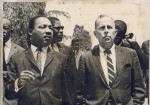Neil Reichline, a first-year student in 1965 and Daily Bruin staffer, sat at the top of the Janss Steps, overlooking the crowd in Wilson Plaza. He said he remembers how unique Martin Luther King Jr.’s speech at UCLA was compared to his other addresses.
“It was not the rabble-rousing, church-sermon, ‘Amen, brother!’ sort of speech that King often made,” said Reichline, who is now a photographer. “It was a very serious and intellectual statement about taking action in the world.”
Then-undergraduate student government representative Dave Clark and then-Vice Chancellor Charles Young invited King in a letter delivered by L.A. ministers who attended the 1965 demonstrations in Selma, Ala.
Then-UCLA Chancellor Franklin Murphy introduced King, who then addressed the crowd of about 5,000 people at the bottom of Janss Steps.
King’s speech was part of the Associated Students of UCLA Distinguished Speakers Program, which invited notable individuals to address students. Speakers have included former Alabama Gov. George Wallace, Student Nonviolent Coordinating Committee chairman Stokely Carmichael and Nobel Peace Prize winner Ralph Bunche.
Reichline said one of the most memorable moments of the speech was King’s call to action for students.
“Things don’t change on their own, things don’t change by waiting for them to change; they change through actions of good people,” King said in his speech.
A central part of the speech was King’s announcement of the formation of the Summer Community Organization and Political Education project, also known as SCOPE. King called on college students from across the country to join SCOPE and help black men and women register to vote in the South.
After King announced SCOPE, Reichline turned to one of his friends and said, “I’m going.”
Willy Leventhal, who attended the speech and joined SCOPE, noted that the audience was transfixed on King, seldom interrupting the speech to applaud him.
King’s speech occurred amid racial discrimination from landlords and local businesses in Westwood.
Students walked to local barbershops known for refusing to attend to black students and demanded service, said Eric Hall, a professor at Georgia Southern University who wrote a book about Arthur Ashe, a tennis player who attended UCLA in the 1960s. Other groups tried to point out housing discrimination by local landlords and report it the administration, he said.
“(Students) used the university structure to kind of phase out those landlords that would discriminate against African Americans,” he said.
Though by 1965 King had become a well-known figure nationwide, only a small number of UCLA students joined him in his crusade.
About 20 students from UCLA left California to help register voters and fight for integration in the South as part of the SCOPE project, said Rick Tuttle, a graduate student at the time who did not attend the speech. Tuttle, as a former member of SNCC, provided advice to SCOPE volunteers on how to carry out their activities.
While many students were inspired by King’s oratory skills during the speech, a former Daily Bruin staffer, Perry Van Hook, who covered the speech, said he thought him and others did not realize the full impact of King and his speech until few years after.
“I don’t think you realized (the impact) as much that day as you did five, ten, 50 years later,” said Van Hook. “It’s hard to take a global look at something when you’re stuck in your small world.”
